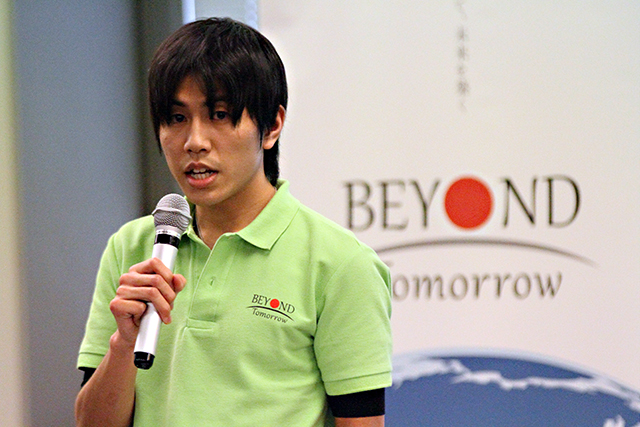BEYOND Tomorrow Public Forum at the UN World Conference on Disaster Risk Reduction
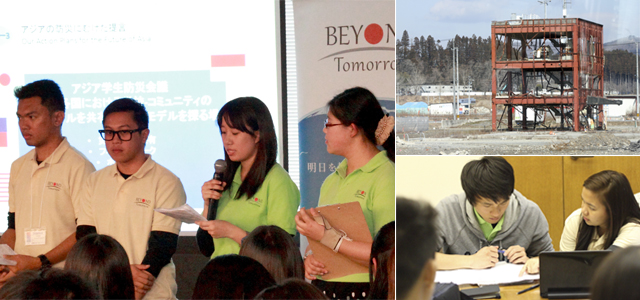
Overview
In March 2015, BEYOND Tomorrow undertook a special session during the Public Form at the UN World Conference on Disaster Risk Reduction in Sendai, Miyagi prefecture. Students who lost their families and homes in the Great East Japan Earthquake and Tsunami spoke about their experiences and the importance of disaster risk reduction. In addition, young people who survived Typhoon No. 30 (Typhoon Yolanda) in the Philippines were also invited to speak on the importance of disaster risk reduction in Asia. These young people, whose lives were devastated by disaster, shared their experiences and presented recommendations about necessary efforts for the future. The program served as an opportunity to showcase the importance of solidarity within the younger generation in Asia.
Objectives
- To disseminate the importance of disaster risk reduction by having young survivors of the Great East Japan Earthquake and Tsunami and Typhoon Yolanda speak about their experiences and perspectives and giving participants the opportunity to go beyond theoretical discussions.
- To showcase the importance of multi-stakeholder cooperation in order to realize realistic and impactful disaster risk reduction and create a momentum for strong solidarity among young people in Asia.
Dates and Location
March 12 – 16- Rikuzentakata, Iwate prefecture
- Keasennuma, Minamisanriku, Tagajo, Sendai; Miyagi prefecture
Participants
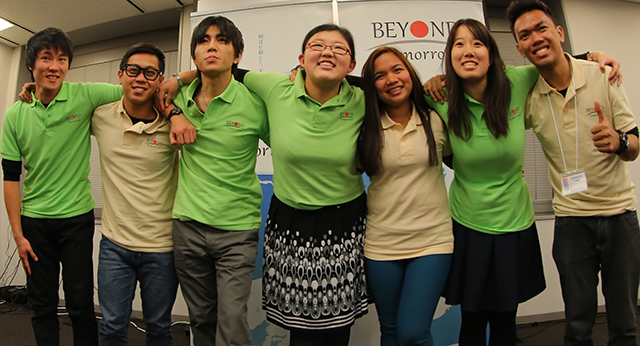
 |
Masahiro Kikuchi (BEYOND Tomorrow/Project HOPE Special Scholarship Recipient) University of Tsukuba, School of Social and International Studies Masahiro lost his parents at his hometown of Rikuzentakata. Having demonstrated his leadership skills as a student council president in high school, Masahiro further developed these skills as the 14th High School Peace Ambassador, travelling to the United Nations headquarters in Switzerland. When he experienced the support offered by the global community after the disaster, Masahiro felt the importance of international relations. He believes that Japan’s mission moving forward is to communicate to the world the necessity of disaster prevention. Masahiro’s dream is to engage in regional autonomy in order to lead the way for Tohoku’s recovery. In particular, Masahiro is concerned about the precarious situation many Tohoku natives find themselves in after losing their jobs and struggling in the difficult economy. He hopes to contribute in solving this unemployment problem and believes that he needs to expand his perspective beyond the borders of Japan. |
 |
Haruka Kurosawa (BEYOND Tomorrow/Chikara Funabashi Special Scholarship Recipient) Dokkyo University, Foreign Language Department Haruka’s high school became a refuge area after the disaster, prompting him to participate in efforts such as food distribution and giving care to the evacuees. When he saw the chaos surrounding the distribution of food and other commodities, Haruka suspected that there must be similar sights in impoverished countries as well. His dream is to work for the United Nations as an expert in developing systems for food management in developing countries. At his university, he is conducting research on poverty and economic disparity. He would like to further his understanding of history in Asia and the current issues it faces to move him closer to achieving his goals. |
 |
Kokurin Saijo Takushoku University, Department of International Studies Kokurin was born in Dalian, China. She came to Japan when she was a 1st year middle school student, and lived in Minamisanriku until she graduated from high school. She lost her home in the disaster. In 2013 she participated in the TICAD V event, and she ran a booth at the event to help inform others about the situation in the areas affected by the disaster, and convey thanks to African leaders for emergency aid after the disaster. She has taken active steps to engage with Rwanda and Ghana, and to learn Swahili and Arabic. Using lessons learned from the disaster, Kokurin wants to use education to encourage economic growth in developing nations in Africa. In the future she would like to find ways to combat poverty as a leader from Tohoku. While she is very interested in helping people in the Middle East and Africa, she would also like to find ways to contribute to the revitalization of her hometown of Minamisanriku. |
 |
Riko Fujii (BEYOND Tomorrow/Teruhide Sato Special Scholarship Recipient) Waseda University, Department of Political Science and Economics Riko lost her grandfather in the tsunami. The people and places she was close to were all taken from her. She dreams of becoming a politician in the future who can represent the interests of people in areas affected by disasters and make the government listen to their voices. Since studying abroad in Malaysia, she wants to communicate lessons she learned from the disaster to a larger audience, and believes that understanding how to deal with earthquakes is important. She also wants to help raise disaster awareness in Southeast Asia in hopes of reducing damage from future disasters. |
 |
Francisco C. Banguis Jr. Project Officer, ICAN Foundation Born in Dagami, Leyte Island. Having hoped to help his parents economically in the future, Francisco decided to pursue his study in the university while many of his high school peers did not continue to higher education. There Francisco was elected as the Chairperson of University of the Philippines Visayas Tacloban College Student Council in 2013. He also joined Kizuna project in March 2013, and visited Kuji city in Iwate Prefecture, Japan as the youth Ambassador. After the typhoon Yolanda, he, as a student leader, initiated a move for the students in need. Having experienced the disaster, he hopes to empower young individuals to contribute to rebuilding Tacloban. With his background as the participant of Kizuna project, he decided to take part in BEYOND Tomorrow’s activities, and hopes to become a bridge between the Philippines and Japan. |
 |
Charles Vincent C. Marnarang Civil Servant, Provincial Government of Leyte Born in Tacloban City, Leyte Island. Despite the financial difficulties Charles had in the past, his family supported him in any means to finish his studies. During his university days, he was elected councilor in the student council. He also joined reputable organizations within and outside campus. He was also selected as one of the participants of the Japan-East Asia Network of Exchange for Students and Youth (JENESYS 2.0), and he visited Kyoto, Japan in 2013 to represent his country as a Philippine Youth Ambassador. Seeing the devastation of his hometown after typhoon Yolanda hit, he hopes to contribute to society by supporting people in need and empower the youth by helping his hometown rise again in simple ways. Through the BEYOND Tomorrow’s activities, he wants to share with students from Tohoku not only the awful experience of the disaster but also its glorious past and beauty of Tacloban. |
 |
Jessa Rapirap Capitol University, BS Education (English) Originally from Cagayan de Oro City, Jessa is studying education at Capitol University. She has an experience of being affected by Typhoon Yolanda and currently participates in disaster risk reduction programs organized by Japan Foundation, Manila. Jessica has experience in translation work and also peace process training in Mindanao. Her interests include journalism and singing. |
Speakers/Guests
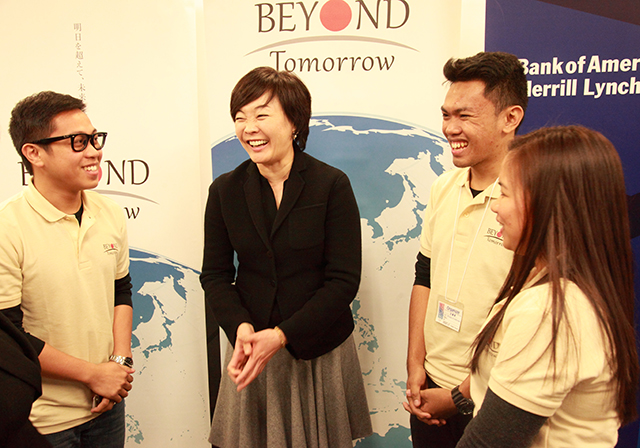
- Akie Abe
- First Lady of Japan
- Kingo Toyoda
- Deputy Director-General, International Cooperation Bureau, Ministry of Foreign Affairs of Japan
- Reiko Hayashi
- Managing Director and Head of Japan Debt Capital Markets, Merrill Lynch Japan Securities Co., Ltd.
- Satoru Nishikawa
- Vice-President, Japan Water Agency
- Natsuko Kaneda
- NPO Sakura net
- Tomoya Yasunaga
- Hiroshima Landslide Disaster Community Support
Participants of the Public Forum
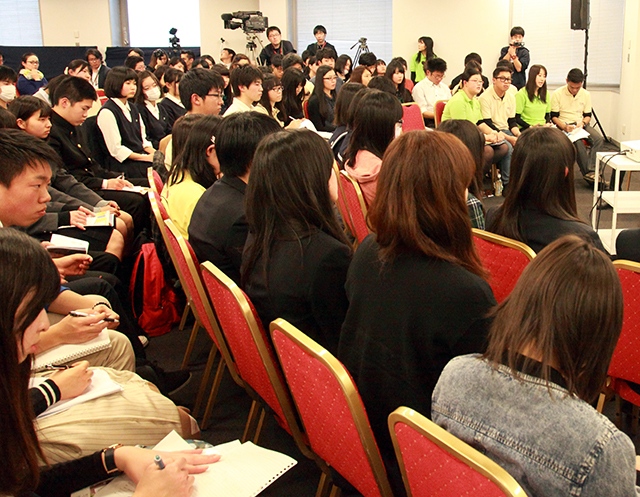
Program Outline
The program was comprised of 3 pillars: “Field Work” where participants visited areas affected by the Great East Japan Earthquake and Tsunami and conducted site visits and interviews with local residents; “Special Session at the Public Forum” where they made presentations at the Public Forum during the UN World Conference on Disaster Risk Reduction.
I. Field Work (March 12 – 14)
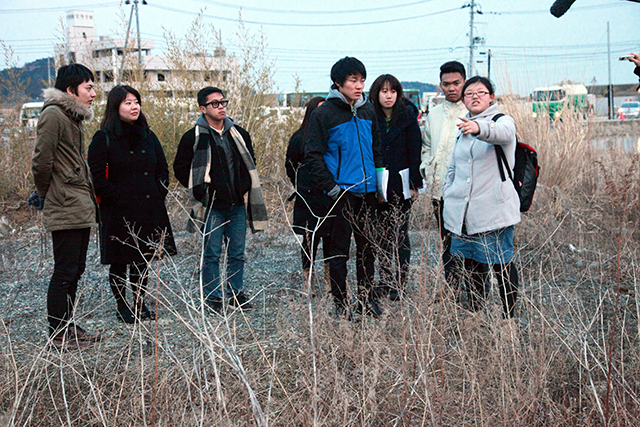
| Rikuzentakata Visit to coastal areas and a local family Guided by Masahiro Kikuchi, one of the steering members, the participants jointed a tour to the city of Rikuzentakata and visited the coastal area where the tsunami swiped everything. They also visited Masahiro’s house. |
| Kesennuma Interviews with local businessmen and center for disaster risk reduction In Kesennuma, the participants interviewed local businessmen in the fishing industry, and also visited the center for disaster risk reduction that plays an important role in ensuring the safety of the residents in the community to learn about Kesennuma’s efforts in disaster risuk reduction. |
| Minamisanriku Visit to tsunami-affected areas and temporary housing, kataribe(storytelling) tour Guided by Kokurin Saijo, one of the steering members, the participants visited her hometown. They visited the area where Kokurin’s house used to be and was lost in the tsunami, and they also visited the temporary housing where Kokurin’s parents currently live, and interviewed with the residents there. |
| Tagajo Visit to Tagajo High School The participants visited Tagajo High School, which is to open a new track focusing on disaster science, and conducted a session with the high school students. Together they visited areas flooded by the tsunami, learned about the high school students’ initiative in disaster risk reduction, and had a discussion session. |
II. Public Forum (March 15)
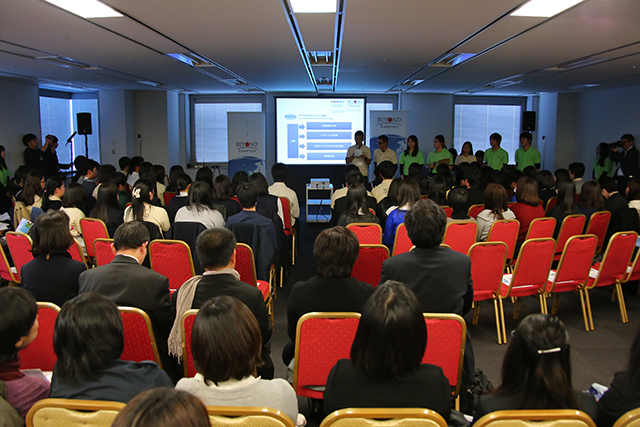
Session Agenda
About BEYOND Tomorrow’s activities in disaster risk reduction Student Speech by Masahiro Kikuchi BEYOND Tomorrow/Project HOPE Special Scholarship Recipient University of Tsukuba, School of Social and International Studies ▼Read the full speechIII. Reflection (March 16)
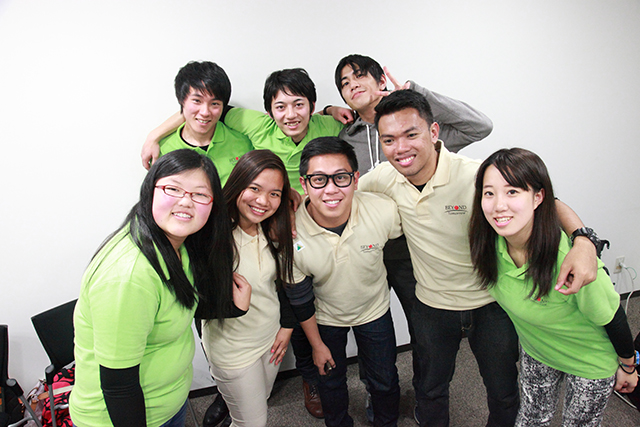
Media Coverage
- The Daily MANILA SHIMBUN
- NHK General TV “World Network”
- Nikkei Shimbun
- Yomiuri Shimbun
- Mainichi Newspapers
- Tokyo Shimbun
- Chunichi Shimbun
- Tokyo Shimbun
- Sankei Shimbun
- THE JAPAN TIMES “3/11 survivors to attend U.N. disaster summit”
Supporter
 Bank of America Merrill Lynch
Bank of America Merrill Lynch
Cooperation
 Japan Foundation, Manila
Japan Foundation, Manila


